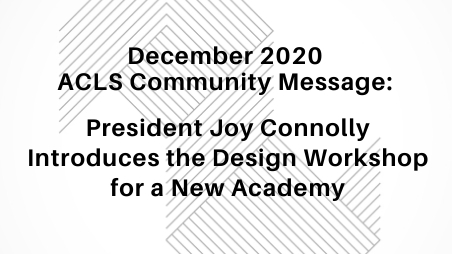December 2020 ACLS Community Message

One of the most compelling and frankly enjoyable aspects of working at ACLS is the ability to talk with people across many different institutions in higher education about how to create better conditions for the production and circulation of knowledge — that is, for scholars and students. With all the reasons to worry about the long-term health of academia – the pandemic, job precarity, challenges of access and equity, and more – these conversations remind us of the sheer talent and creativity out there among faculty, administrators, and graduate students. Not only do we learn from every exchange, but we hope our interlocutors are inspired and encouraged by the fellowship with colleagues around the country whom they may have never met before but who share their problems and hopes.
Fascinating strands emerge in these talks: the interest of HBCU faculty in strengthening relationships with faculty in African universities; grass-roots efforts to radically rethink standards for tenure and promotion; growing undergraduate interest in interdisciplinary programs with a heavily humanistic component like public health and food studies.
But these meetings also make vividly real what John Kutsko, Executive Director of the Society for Biblical Literature, recently described to me this way: “Academia has system-wide problems – but no system.” For society to heal from the pandemic and emerge in a stronger, more just form, we need humanistic knowledge. We are keenly aware that to keep the humanities and social sciences at the center of higher education, progress needs to be systemic and structural.
ACLS has a distinctive century-long history of convening people in the name of progress. Now, thanks to a generous grant from the Henry Luce Foundation, ACLS is organizing action to sustain the humanities and humanistic social sciences in higher education in the United States. We call this effort the “Design Workshop for a New Academy.” The workshop consists of a series of conversations and convenings that will marry the visionary with the pragmatic. We aim to identify the most pressing challenges facing the humanities and social sciences, and to design and circulate concrete, collaborative approaches to address them.
In planning the Design Workshop, we are fortunate to be able to draw upon the seasoned wisdom and imagination of colleagues across the country who have been working for decades on how we can expand our definition of scholarship and scholarly achievement, improve and make more inclusive our practices of recruitment and evaluation, better engage today’s diverse community of undergraduates, and increase public understanding of our work.
We will ask questions like: if one were to define expertise today, what would it look like? If we were design doctoral education from scratch today, what would it look like? How would it train graduate students for the jobs of tomorrow in academia and beyond? How can we help new programs of study speak to undergraduates facing the burden of loans, the pressure to prepare for careers, and the challenges brought about by a changing climate, public health, racial injustice, and the evolution of work? This is the time to re-envision the institutional and disciplinary structures that support the humanities and social sciences as they have been and as they might be.
We hope the Design Workshop will join ACLS’s earlier efforts to move the academy forward – for instance, by helping create the field of African Studies in the 1930s and convening a Commission that synthesized our collective map for digital infrastructure in the early 2000s. This work to strengthen academic infrastructure helps scholars in every field.
Your support enables us to lift up more of these outstanding scholars each year. Thank you!

Joy Connolly

